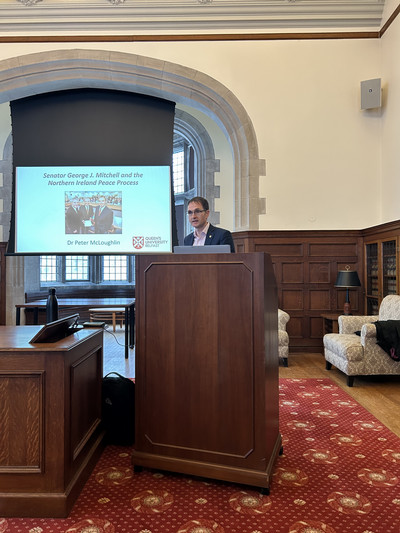Angus King Blogs
The Bowdoin Daily Sun‘s newest columnist is Angus King, a distinguished lecturer at the College since 2004, a two-term governor of Maine, and the former host of “Maine Watch” on the Maine Public Broadcasting Network. Now, against his better judgment, Governor King is a blogger.

So Barry Mills has asked me to write an occasional blog for the Sun and I agreed. He said I could decline but he didn’t really mean it (sometimes you just know these things). You have to understand that the whole idea of blogging goes against every fiber of my legal, political and personal being. For someone who has made a career of carefully measuring each thought, idea, and (especially) word, the very concept of dashing off random thoughts on whatever topic comes to mind and then committing them to a searchable and semi-permanent medium is downright appalling.
I think this aversion took root from two experiences when I was a kid. The first is the vivid memory of my elementary school principal (Miss English–a truly formidable woman) whose most frightening admonition was, “This will go on your [dramatic pause] Permanent Record.” Big emphasis on “PERMANENT.” At the time—and to this day—I had visions of a kind of doomsday book which would follow me everywhere, would be known to all, and could never be altered or expunged. The second, and connected, memory is of my Mom (another truly formidable woman–in fact, she made Miss English seem downright cuddly) telling me when I was starting to write letters to absent girlfriends, “Don’t put it in writing”. She didn’t specify what “it” was, but somehow I knew.
And so even to this day, in the opening class of my course on leadership at Bowdoin, I spend a fair amount of time telling my students how crazy it is to release unformed thoughts and compromising pictures out into cyberspace, how anybody can Google you (isn’t it cool, by the way, that we were around for the invention of a new verb, “to Google”? Can you imagine being able to tell your grandchildren, “I was there when they invented ‘run'”) and you could miss out on a job, a date, or the love of your life.
This is all a part, I suppose, of the acceleration of our lives—where everything happens fast, time for contemplation is rare, and reflection refers only to one’s image in a mirror. Take e-mail, for example. Or, as Jack Benny would say, take e-mail…please. It’s a great way to communicate, for sure–no finding paper, a pen, envelopes, or that rarest of all commodities, a stamp in the right denomination. No laborious hand writing (and re-writing when you make a mistake), no walk to the post office. But also, no time to think, consider or re-consider. I wish my e-mail program had a second button next to “send” which said “send in the morning but only after I have re-read it and made a deliberate and conscious decision that whatever I wrote is suitable for reading by my worst enemy because that’s where it will inevitably end up”. And while we’re at it, how about a third button which will make the message self destruct and release a terrible virus if the recipient tries to forward it?
And then there’s the fact that the internet often isn’t a very friendly place. Have you ever noticed that no matter the topic—baseball, travel, wind power (well, maybe especially wind power)—the online comments which follow the main story are usually negative, personal, and downright unpleasant. For example, just this morning, I was reading an on-line review of the new iPhone and inadvertently strayed into the comments. It was like getting off the wrong bus in a bad neighborhood of a strange city in the middle of the night. The denizens started by attacking the author of the article, but soon were at each other in terms too graphic for a family college blog. Suffice it to say that the size of one another’s private parts came into the discussion. Over the iPhone; I’m not making this up.
I’ve often wondered why this is so–why people seem to lose the patina of civilization when they open the comment box of their local paper. The first reason that comes to mind is that the patina of civilization is just that—a patina, and it doesn’t take much to scratch through it. But the key reason, I think, is that they can be anonymous. You can say anything, but as far as your identity is concerned, no one’s the wiser. George Bernard Shaw once observed that, “None are so brave as the anonymous,” and he was right. It strikes me as odd that if you want a letter to the editor published in the print version of the newspaper, you still have to sign it and identify your town of residence—and, quite often, the paper will call you to be sure you are who say you are and that you really wrote the letter. Not so online. You can say anything, make up anything, allege anything, all without the slightest responsibility to back it up.
Maybe this will be my next project—an op-ed suggesting that the papers require on-line commenters to sign their real names.
Wait until you see the comments on that.



